Currently based in New York, Kai Oh (b. 1992) has been consistently experimenting with expanding the boundaries of photography. Her work primarily involves discovering traces of often-overlooked beings that exist beneath the surface of urban spaces. She captures these traces through her camera lens and reconstructs them into imagined scenes through post-production.
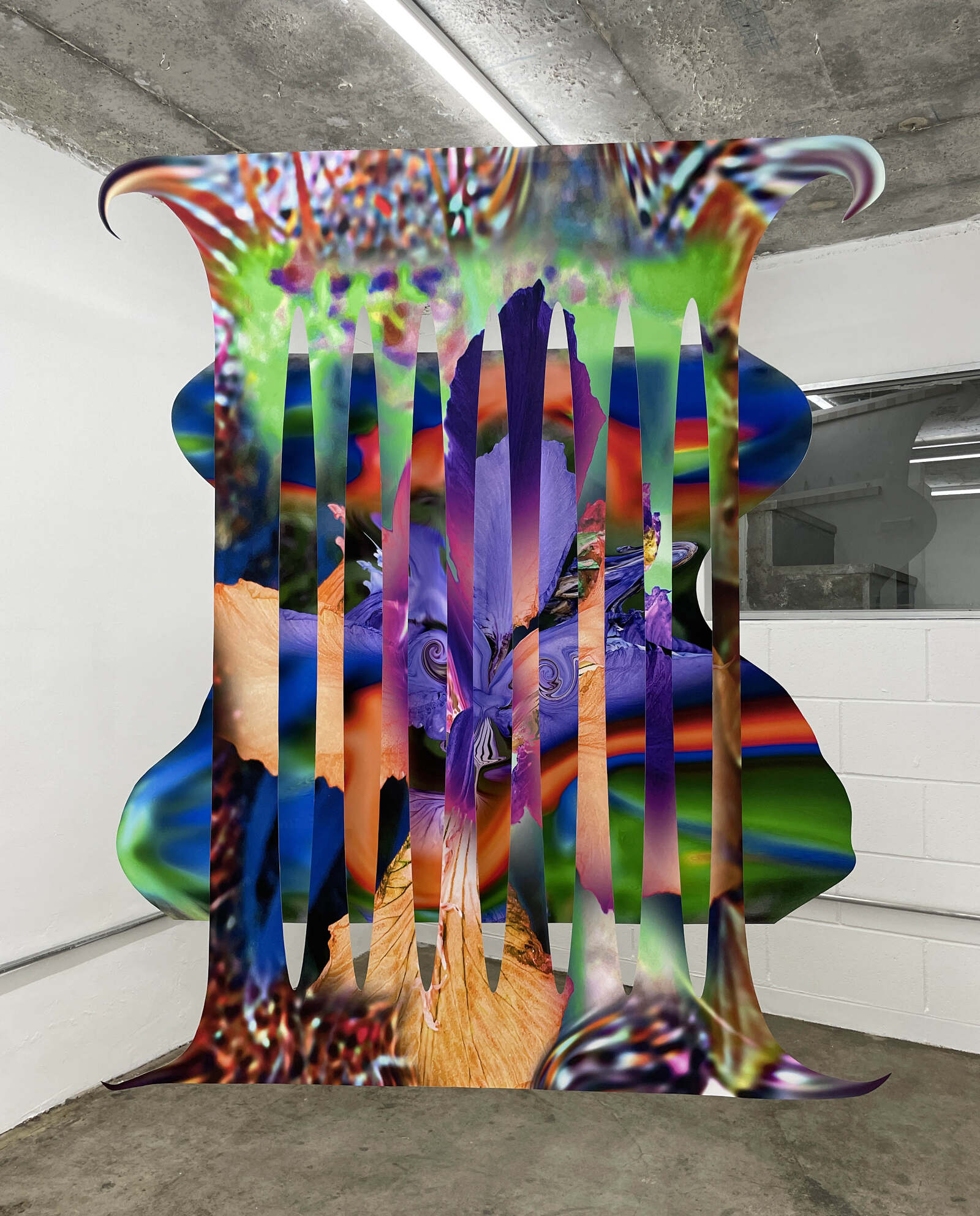 Installation view
of 《Awkward Gaps》 (Whitenoise, 2021) ©Kai Oh
Installation view
of 《Awkward Gaps》 (Whitenoise, 2021) ©Kai OhKai Oh’s work begins with capturing ecosystems of non-human life forms that exist beneath the rigid and spectacular surfaces of urban spaces, along with signifiers and symbols whose meanings shift according to their geopolitical context. The subjects of her work are observed and recorded through the lens of her perspective and sensibility as a foreigner who has lived and adapted in various cities, including Seoul, Berlin, Nuremberg, New York, and The Hague.
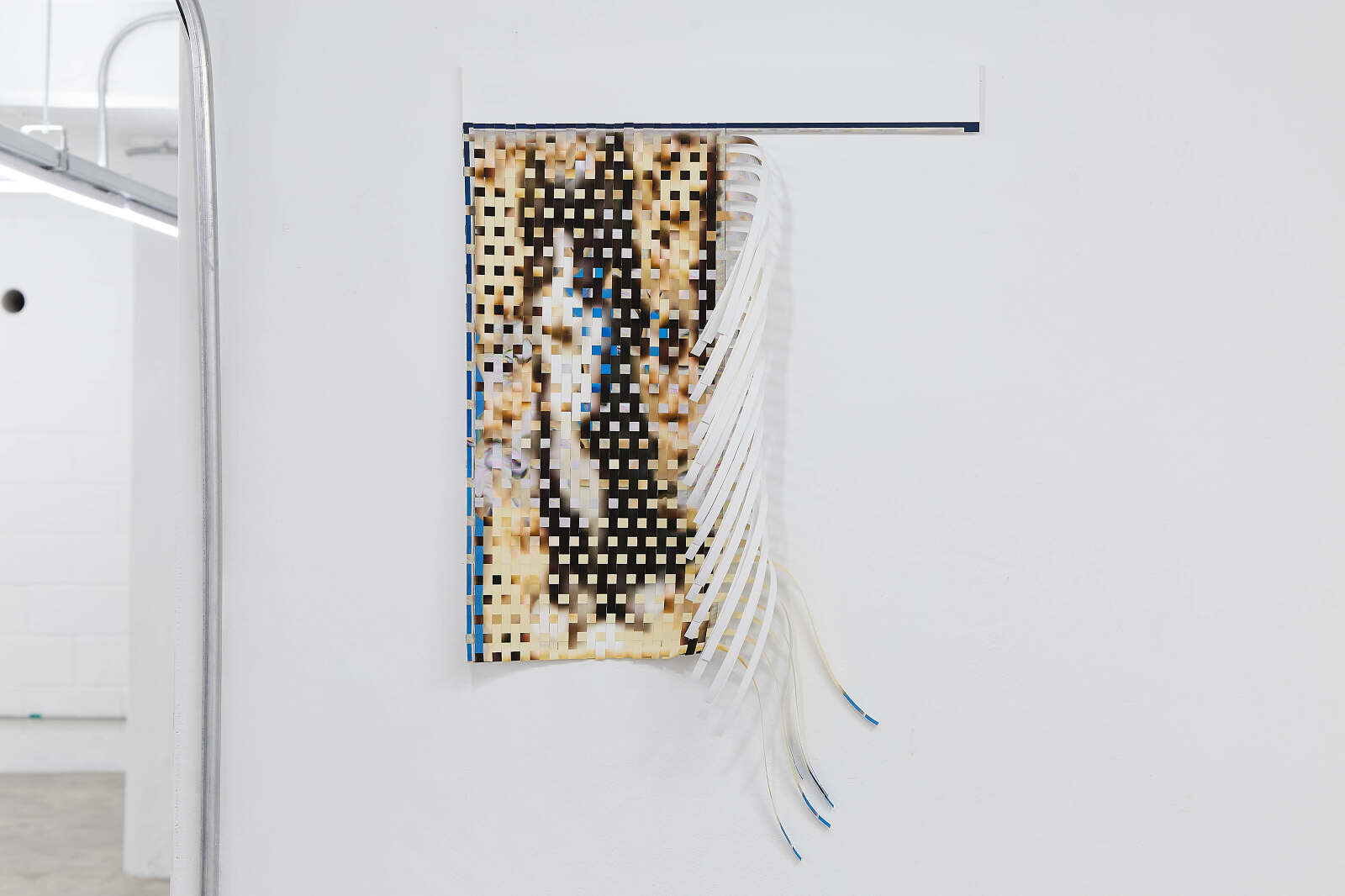 Installation view
of 《Awkward Gaps》 (Whitenoise, 2021) ©Kai Oh
Installation view
of 《Awkward Gaps》 (Whitenoise, 2021) ©Kai OhOh begins by walking with a camera or
iPhone in hand, capturing images that she later transfers to her computer.
Using programs such as Photoshop, she edits, distorts, and retouches these
photographs. As she layers the edited images and composes them organically, her
imagination and subjectivity intervene, giving rise to surreal visual scenes.
Kai Oh has continued to question whether “a
photograph has to end as a single image” and whether “there might be
alternative ways for a photograph to be installed.” These inquiries have led
her, with each new exhibition, to explore not only image editing but also the
physicality of printed, two-dimensional photographic images—transforming and
reinterpreting them through various methods.
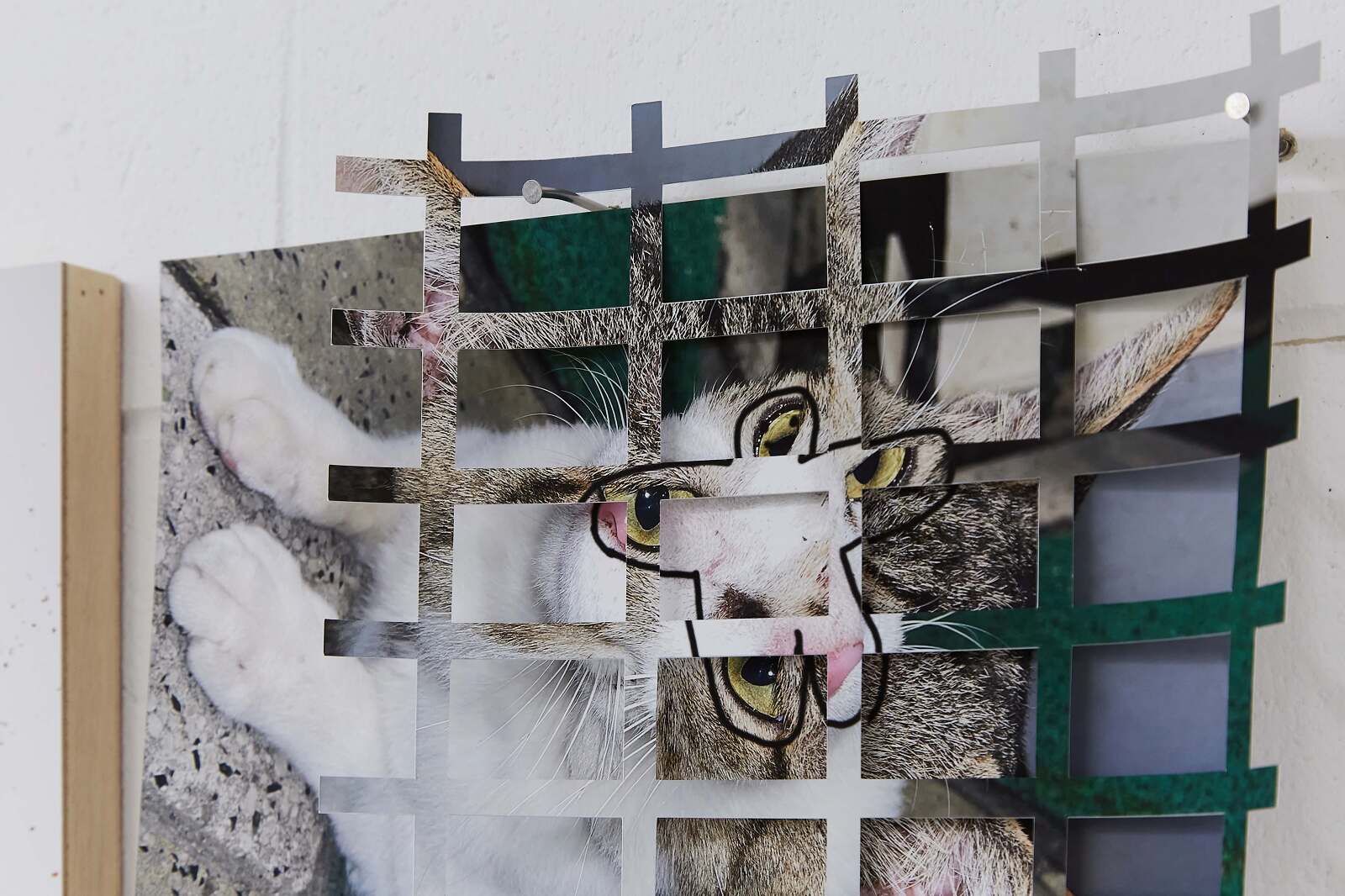 Installation view
of 《Awkward Gaps》 (Whitenoise, 2021) ©Kai Oh
Installation view
of 《Awkward Gaps》 (Whitenoise, 2021) ©Kai OhThe ‘Cat Series’ (2021), presented in the two-person exhibition 《Awkward Gaps》 held at Whitenoise in 2021, originates from photographs the artist took of cats she encountered. In this series, Kai Oh actively experimented with the materiality of photographic paper by printing digital images and repeatedly engaging in acts of cutting, weaving, and reassembling them—thus pushing the boundaries of the photographic medium beyond the flat surface.
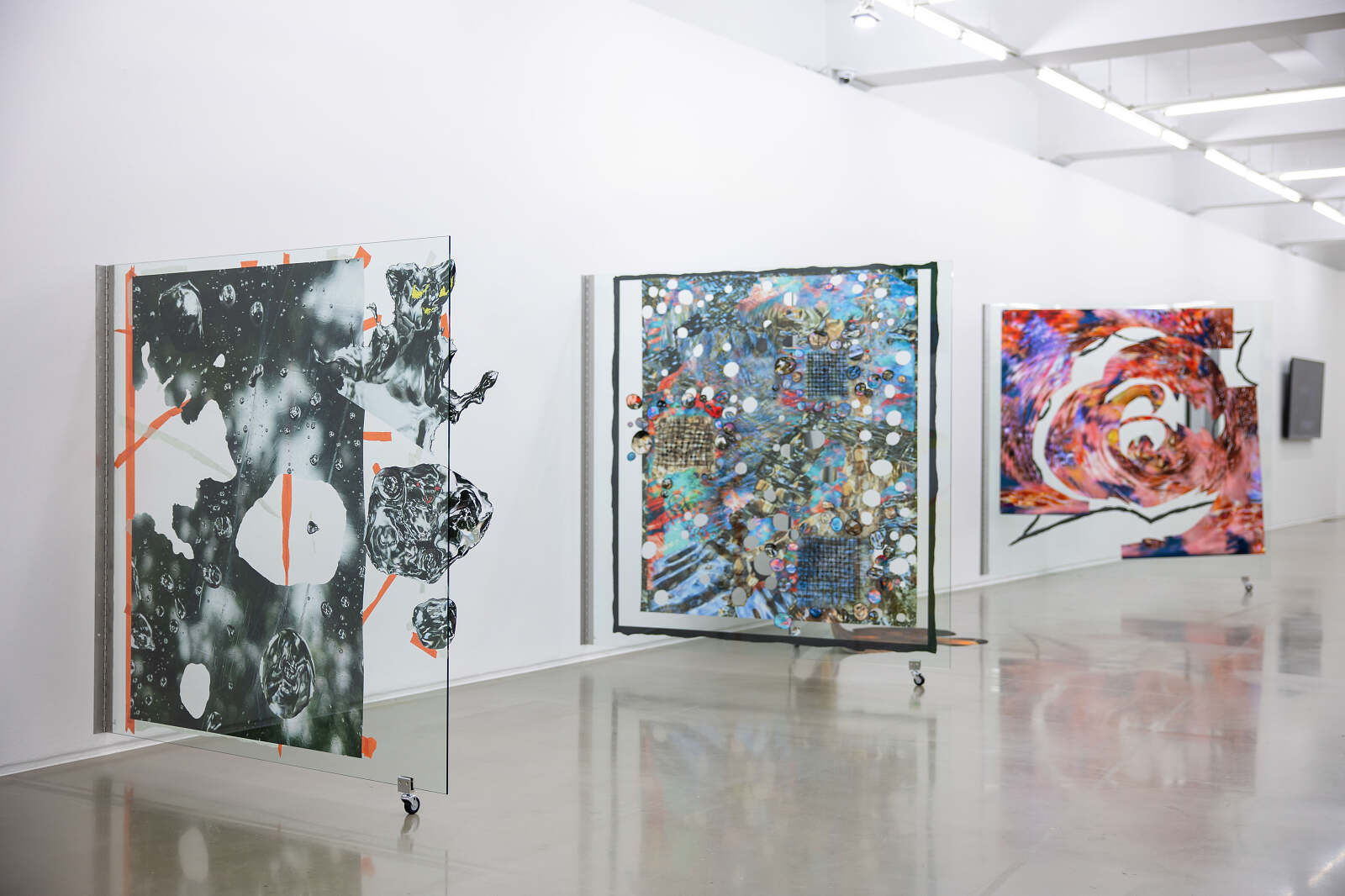 Kai Oh,
Semi-frame Series, 2021, Archival pigment print on matt
paper, glass, hinge, wheel, Size variable, Installation view of 《Super-fine》
(Ilmin Museum of Art, 2021) ©Kai Oh
Kai Oh,
Semi-frame Series, 2021, Archival pigment print on matt
paper, glass, hinge, wheel, Size variable, Installation view of 《Super-fine》
(Ilmin Museum of Art, 2021) ©Kai OhIn her ‘Semi-frame Series’ (2021),
presented at the group exhibition 《Super-fine》 held at the Ilmin Museum of Art in 2021, Kai Oh positioned the
photographic subjects in a state that was neither fully framed nor entirely
partitioned, but rather in a neutral zone. She digitally deconstructed,
reconfigured, and rearranged the photographs in Photoshop, then manually cut
out the shapes and affixed them to the surface of glass.
The transparent quality of the glass
creates the illusion that the swirling, protruding images are traversing the
exhibition space. Instead of confining the photographic image within a fixed
frame, Oh attached images to both the front and back of the glass—or at times
only to one side, leaving the reverse side fully exposed—and allowed some
elements to extend all the way to the floor. This approach enabled the images
to flow freely and intrude into the space, emphasizing their fluid and
uncontained presence.
Furthermore, each of the four glass panels
was equipped with hinges suggestive of movement, and wheels that allowed the
surfaces themselves to physically shift, thereby giving tangible form to the
motion suggested in the images.
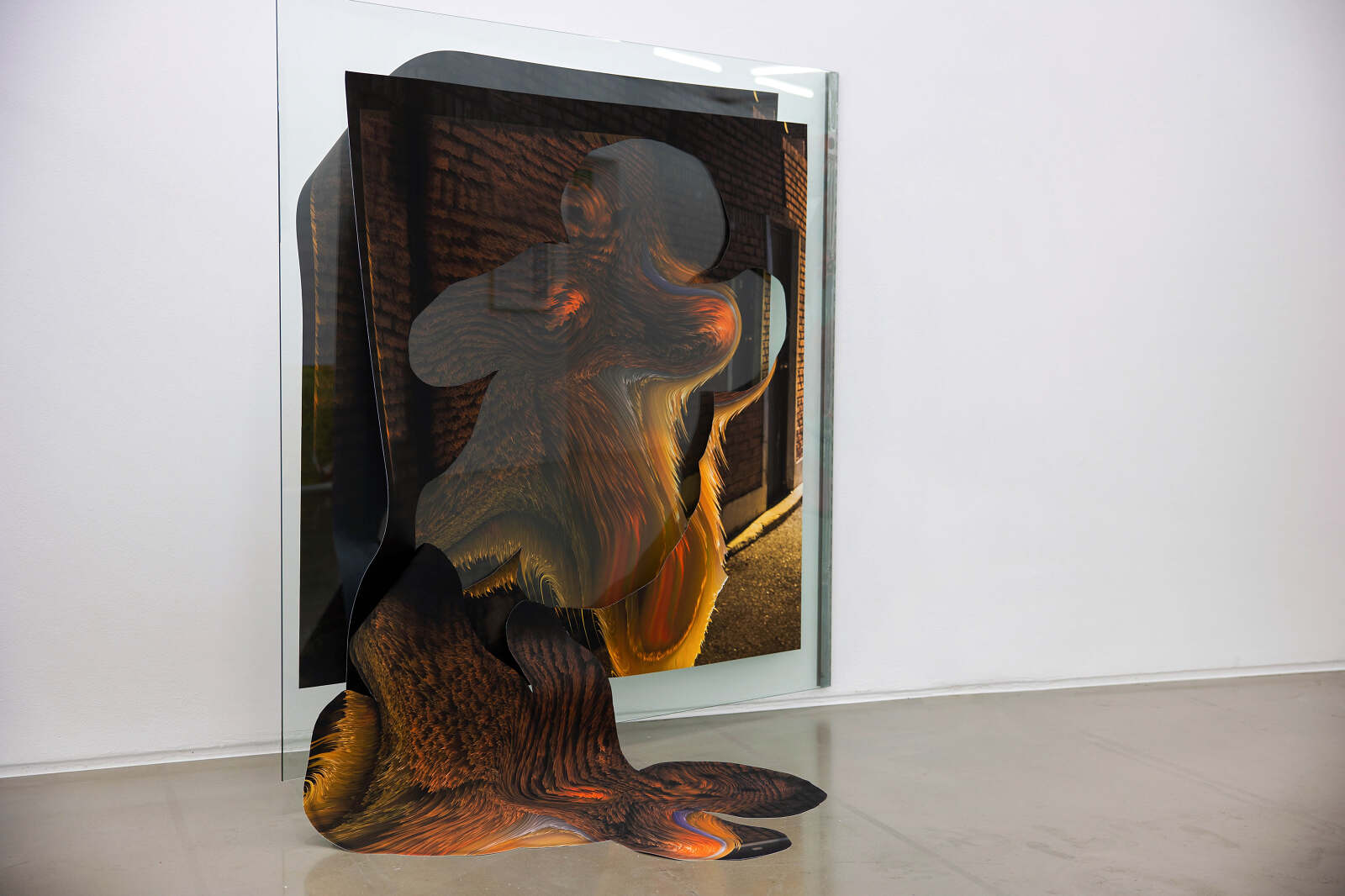 Kai Oh,
Semi-frame Series, 2021, Archival pigment print on matt
paper, glass, hinge, wheel, Size variable, Installation view of 《Super-fine》
(Ilmin Museum of Art, 2021) ©Kai Oh
Kai Oh,
Semi-frame Series, 2021, Archival pigment print on matt
paper, glass, hinge, wheel, Size variable, Installation view of 《Super-fine》
(Ilmin Museum of Art, 2021) ©Kai OhEach work is composed of reconstructed
images based on the artist’s imagination, sparked by ordinary and everyday
moments. For instance, the piece that appears to pierce through the exhibition
wall and flow down onto the floor originated from a memory in which the artist,
gazing at the wall in front of her house one day, felt as though the wall was
dividing space and firmly blocking something.
In that moment, she imagined a being that
could freely escape the wall and disregard its presence altogether. This idea
materialized through duplicating the same image twice and attaching it to both
the front and back surfaces—creating a form that seems to break through and
emerge from the wall itself.
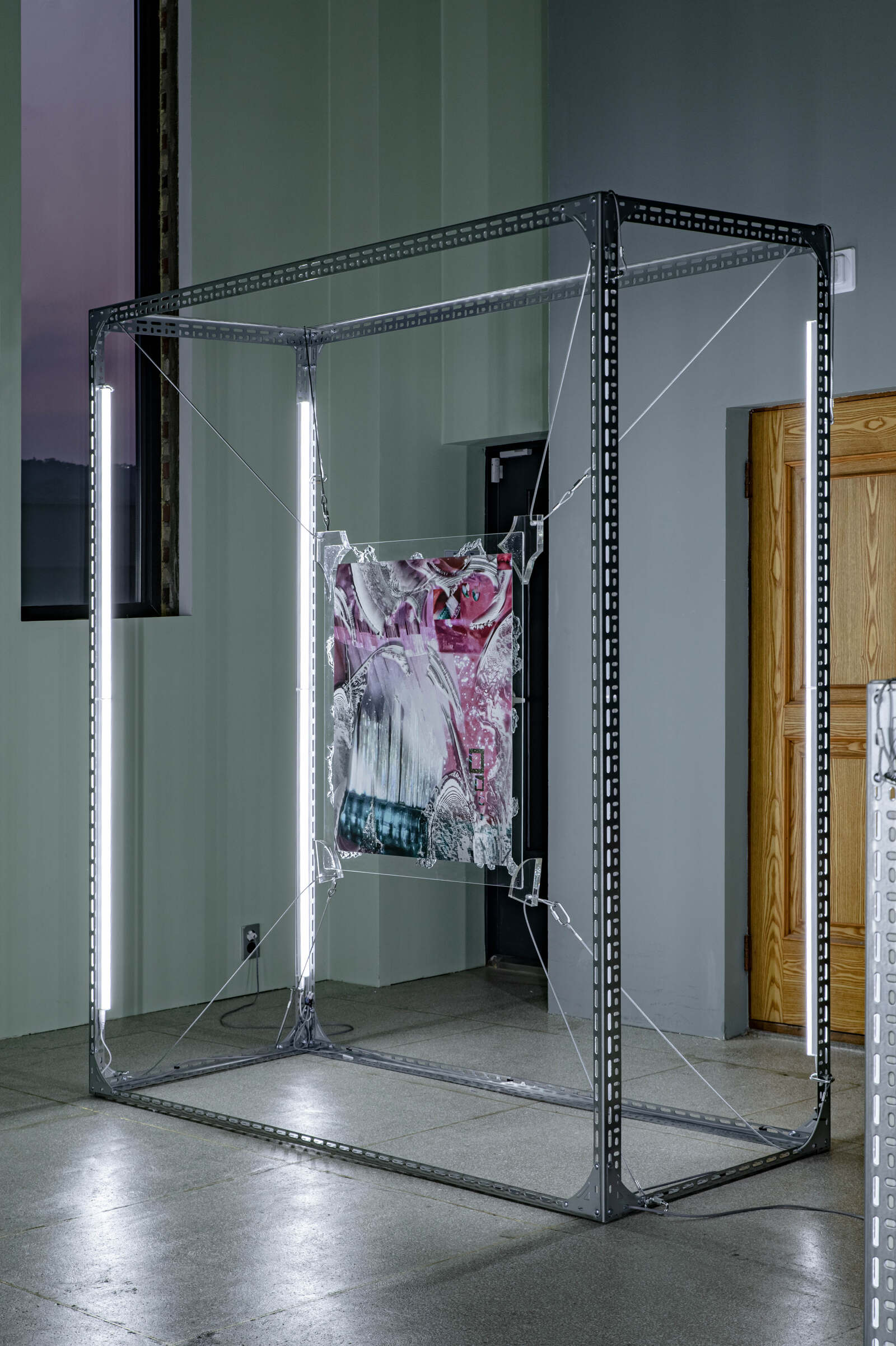 Kai Oh, Tongue
Bed, 2022, Archival pigment print, 83x93cm, Installation view of 《Temporary
Landing》 (This is Not a Church, 2022) ©Kai Oh
Kai Oh, Tongue
Bed, 2022, Archival pigment print, 83x93cm, Installation view of 《Temporary
Landing》 (This is Not a Church, 2022) ©Kai OhMeanwhile, in the 2022 group exhibition 《Temporary Landing》 held at This is Not a
Church, Kai Oh presented five works based on images of the inside of a mouth
and the underground. In her pieces, images of mouths and toothbrushes, soil and
roots appear in distorted relationships—subtly shifted from their natural interactions—provoking
an uncanny sensation.
For instance, multiple toothbrushes are
shown crammed into a single mouth, or the roots exposed from the soil appear to
be pulled in opposing directions. At times, the images of the mouth and the
earth are intermingled, creating a surreal and disorienting effect.
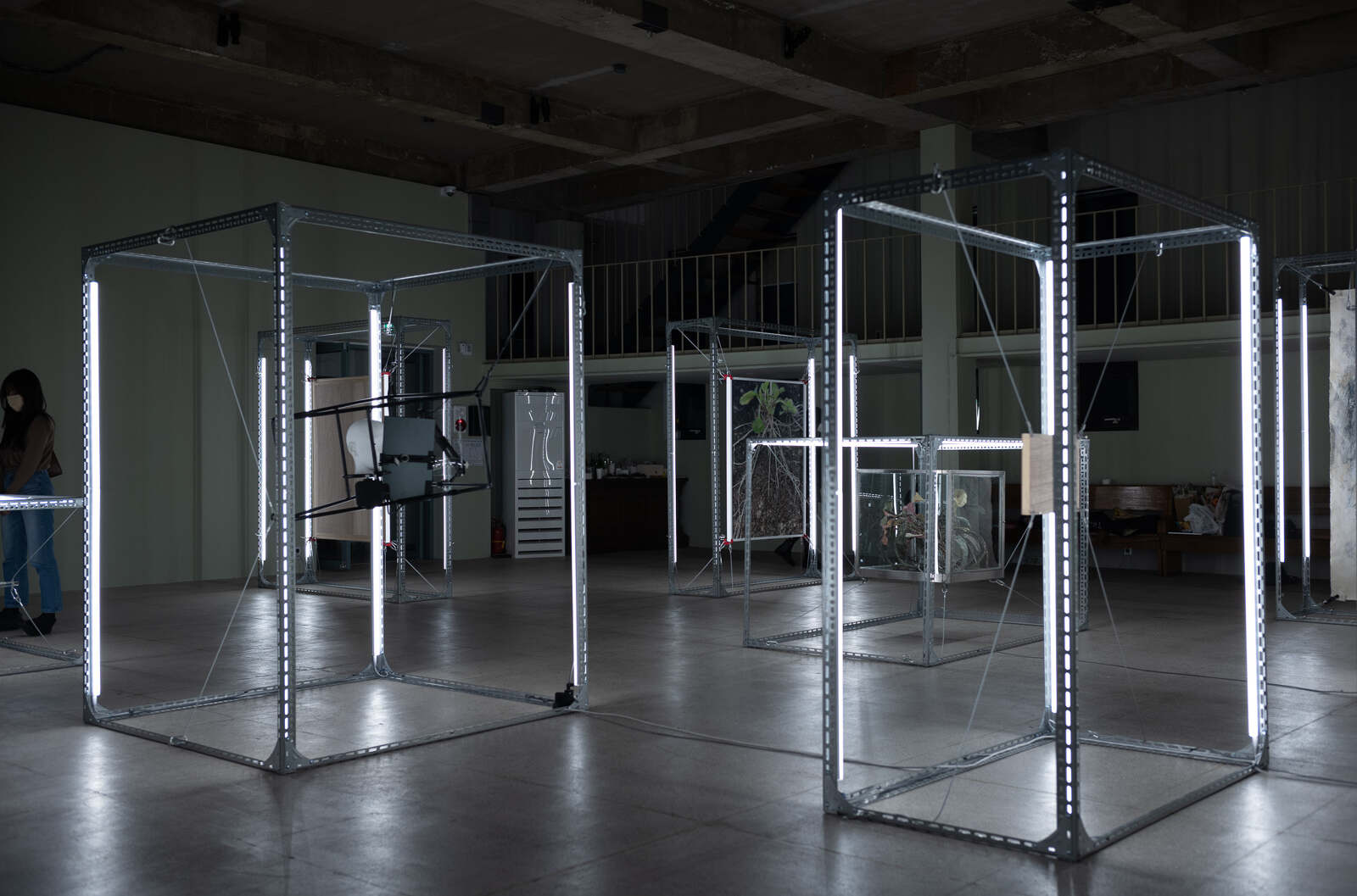 Installation view
of 《Temporary Landing》 (This is Not a Church,
2022) ©Kai Oh
Installation view
of 《Temporary Landing》 (This is Not a Church,
2022) ©Kai OhIn this way, Kai Oh disrupts the safe and controlled state of two delicate and highly selective receptors of external matter. The five works, each positioned at a distance from one another in the exhibition space, are connected to fixed supports of varying forms and methods, each expressing a different sense of tension and weight in relation to gravity.
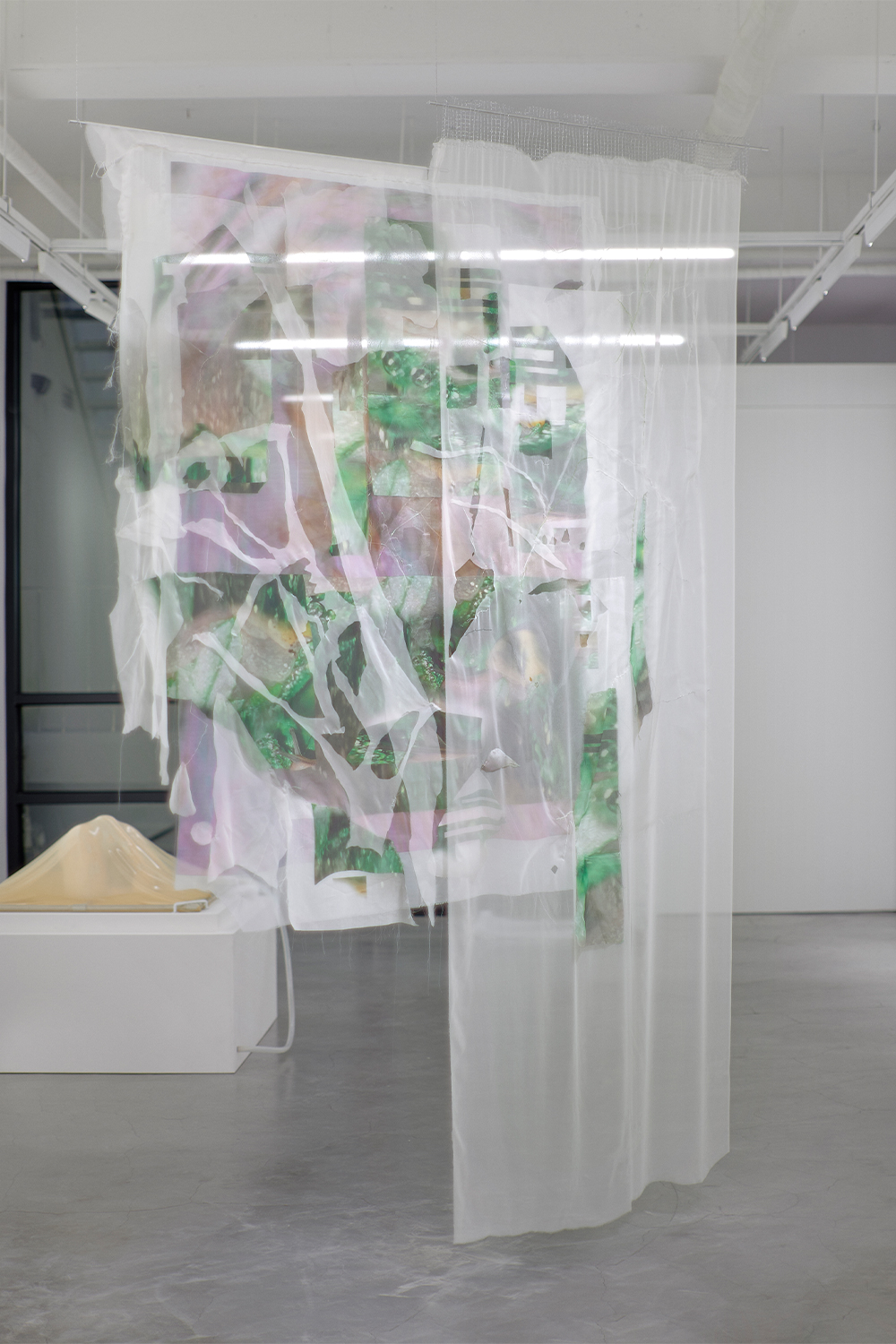 Kai Oh, Web(in
Pink, Green and 0), 2023, Silk, silk thread, cotton thread, wool
thread and pigmented print on voile fabric, 311x200cm, Installation view of 《Autohypnosis》
(G Gallery, 2023) ©G Gallery
Kai Oh, Web(in
Pink, Green and 0), 2023, Silk, silk thread, cotton thread, wool
thread and pigmented print on voile fabric, 311x200cm, Installation view of 《Autohypnosis》
(G Gallery, 2023) ©G GalleryIn this way, Kai Oh has continuously
experimented not only with diverse material manipulations of photographic
images, but also with modes of installation that convey her reimagined, uncanny
visuals. In the 2023 group exhibition 《Autohypnosis》 at G Gallery, she presented installation works in which images were
printed on fabrics of varying textures, thicknesses, and degrees of
transparency—such as velvet, silk, voile, cotton, and mesh—then shaped
sculpturally in accordance with each material's physical properties.
The exhibited fabric installations,
Morningside Park Snail (2023), Web (in Pink, Green
and 0) (2023), and Snail (Void) (2023), began with
photographs the artist captured in the city where she lives as an outsider.
These images were printed, cut, and interwoven into fabric layers, stacking
spatial strata upon one another across the textile surfaces.
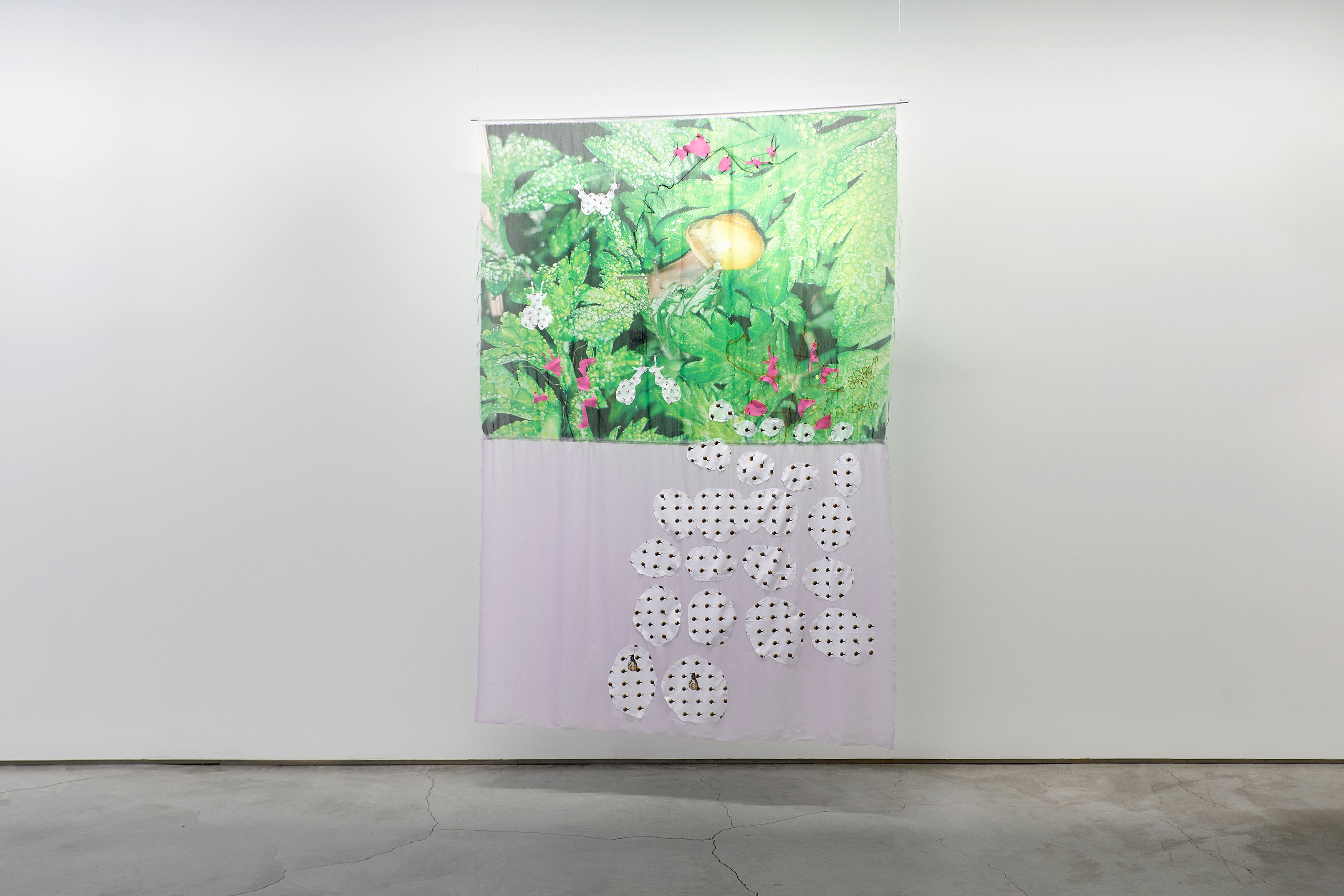 Kai Oh,
Morningside Park Snail, 2023, Cotton, wool, cotton thread,
polyester thread and pigmented print on voile fabric, 241x175cm, Installation
view of 《Autohypnosis》 (G Gallery, 2023) ©G
Gallery
Kai Oh,
Morningside Park Snail, 2023, Cotton, wool, cotton thread,
polyester thread and pigmented print on voile fabric, 241x175cm, Installation
view of 《Autohypnosis》 (G Gallery, 2023) ©G
GalleryAs Kai Oh adapts to the context of each new
city she inhabits, she captures with her camera the conflicting internal
sensations of estrangement and acceptance, as well as phenomena that recur
across different urban environments. The subjects of her work are often neutral
elements—those tied to the cycles of nature—that can be observed anywhere.
The “snail” that frequently appears in her
work serves as a metaphor for this process. Like a copied-and-pasted image, the
snail repetitively clings to the printed fabric surface, embodying both
adaptation and quiet persistence.
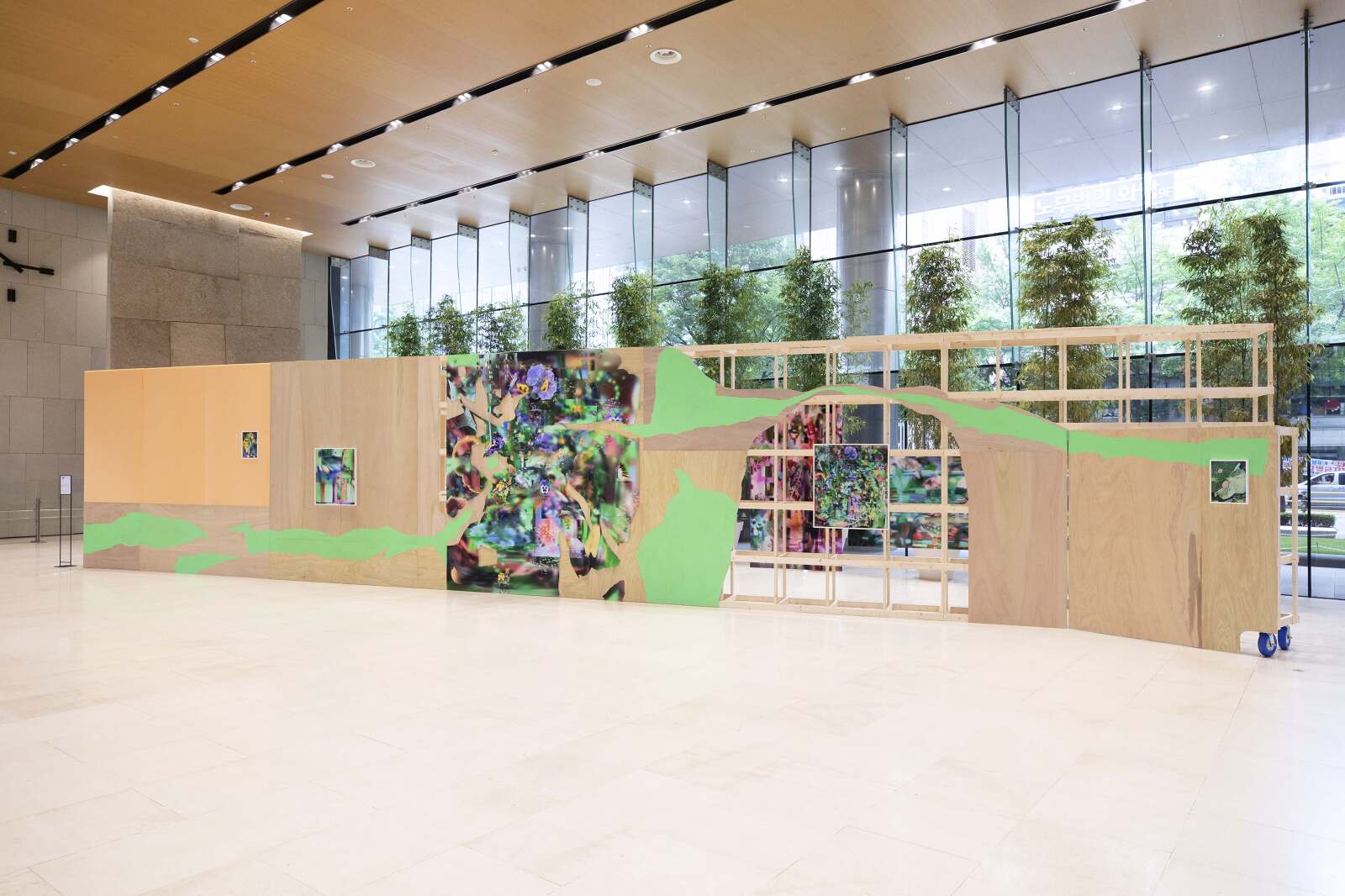 Installation view
of 《Half Sticky》 (IBK Industrial Bank of Korea,
2023) ©Kai Oh
Installation view
of 《Half Sticky》 (IBK Industrial Bank of Korea,
2023) ©Kai OhIn this way, Kai Oh continues to explore
the physicality of photography by not only digitally re-editing collected
images, but also engaging in manual processes such as cutting, puncturing,
weaving, and painting over photographs.
In her 2023 solo exhibition 《Half Sticky》, presented after being selected
for “IBK & GMoMA YOUNG ARTISTS 2023,” she expanded the material properties
of photography by incorporating disparate materials like sponge and structural
elements such as temporary partition walls as supports for the work.
By drawing spatial components like wall
structures and surfaces into the work, the artist transforms the installation
into a large-scale photographic environment and fluidly extends the materiality
of her digital collage images.
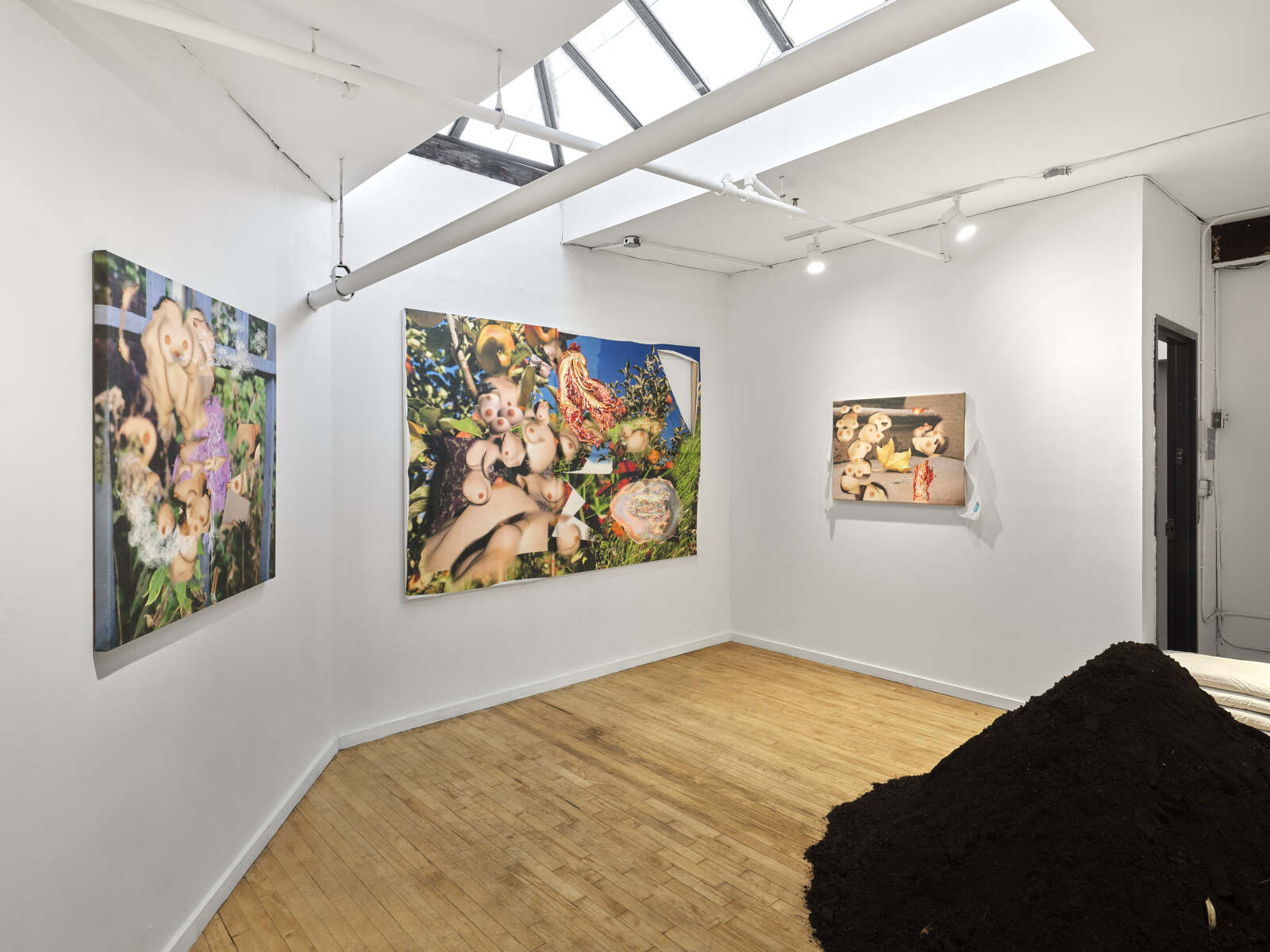 Installation view
of 《Will you Marry Me?》 (Subtitled NYC, 2025) ©Kai
Oh
Installation view
of 《Will you Marry Me?》 (Subtitled NYC, 2025) ©Kai
OhIn her recent solo exhibition 《Will you Marry Me?》 (Subtitled NYC, 2025),
Kai Oh presented a new body of work that, rather than centering on her
surrounding environment, focused on collages of her own body. Her latest
series, ‘Unpleasant Episodes’ (2025), weaves together humor, defiance, and
photographic images of her breasts and nipples.
For Oh, the body is a site of both intimacy
and projection, shaped as much by personal experience as by external scrutiny.
Women’s breasts and nipples, in particular, are often subject to double
standards: celebrated as symbols of beauty under certain conditions, yet deemed
indecent and in need of covering or flattening under others.
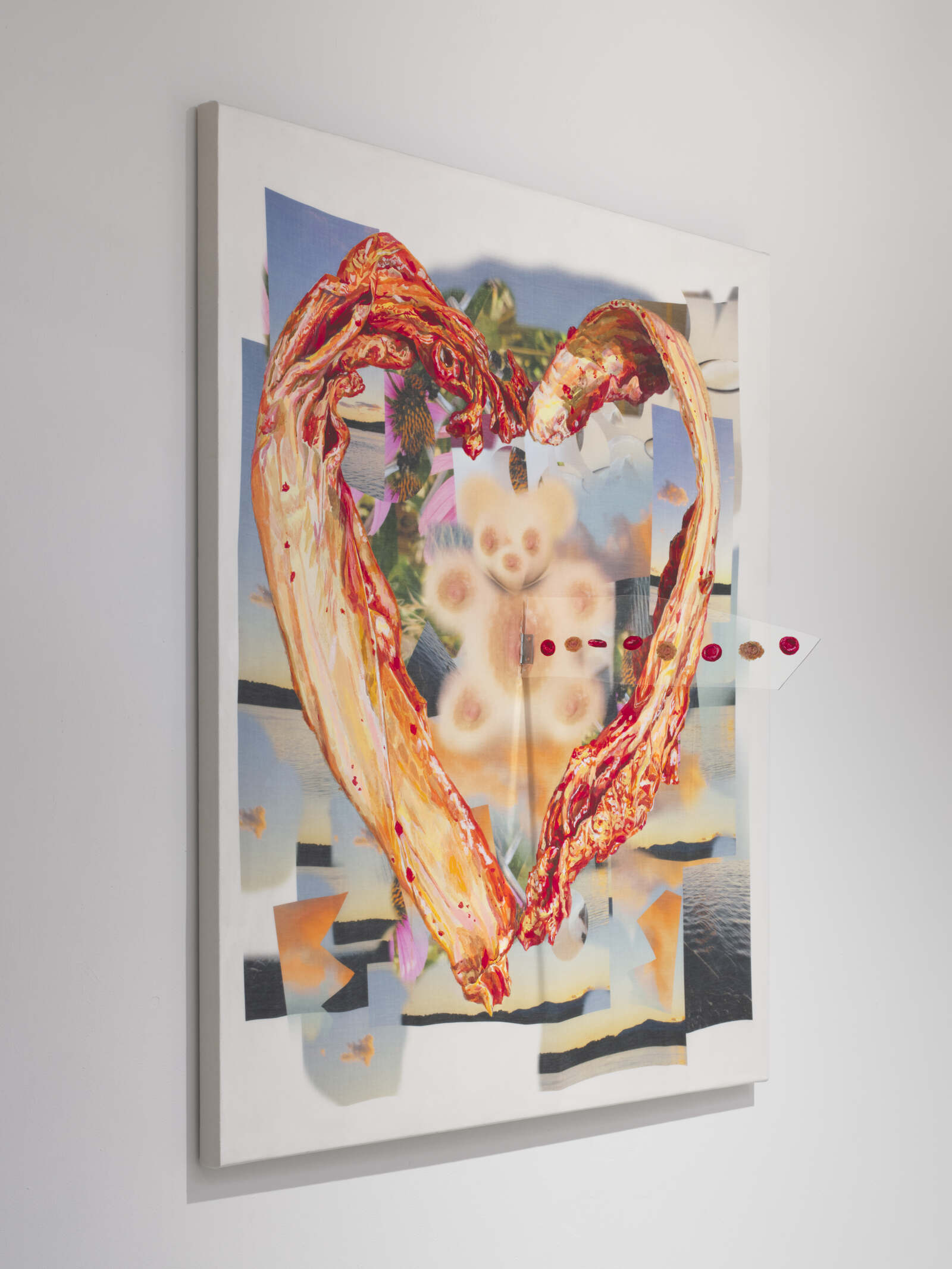 Kai Oh, Hug
me, 2025, Installation view of 《Will you Marry Me?》
(Subtitled NYC, 2025) ©Kai Oh
Kai Oh, Hug
me, 2025, Installation view of 《Will you Marry Me?》
(Subtitled NYC, 2025) ©Kai OhOh confronts these contradictions through
the fragmentation and reassembly of these bulbous curves and protrusions,
underscoring how they are simultaneously hyper-visible and overlooked. Her
primary method is digital collage; by layering and blending, she deconstructs
and reconfigures breasts and nipples, exposing how bodies are flattened and
codified into objects or symbols. What might appear sensual or maternal in one
context instead becomes something altogether different here—a grotesque yet
whimsical presence, severed from its usual associations.
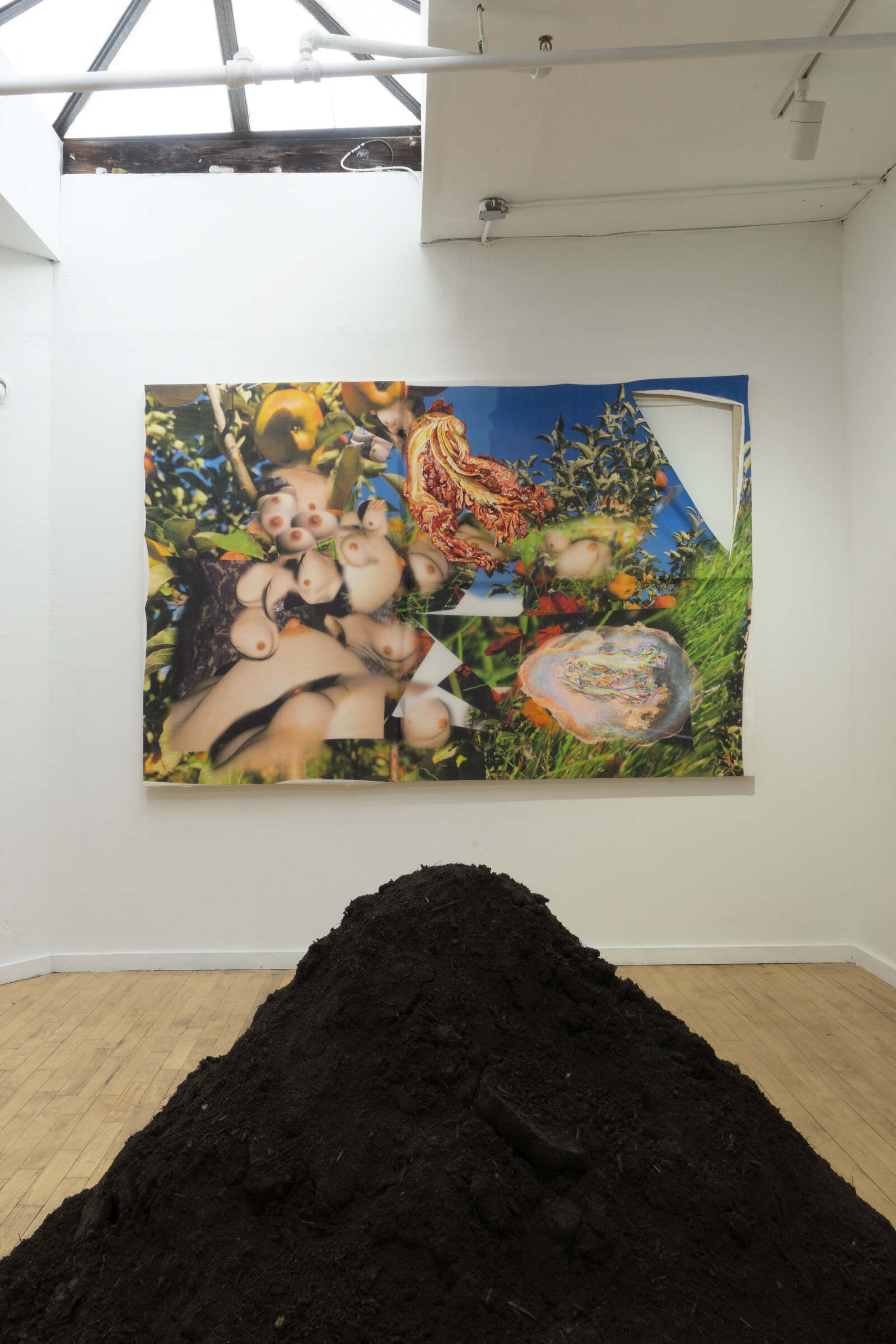 Installation view
of 《Will you Marry Me?》 (Subtitled NYC, 2025) ©Kai
Oh
Installation view
of 《Will you Marry Me?》 (Subtitled NYC, 2025) ©Kai
OhAdditionally, Kai Oh introduces the
disparate materials of silk and soil as an expanded part of the work. The
translucency of silk evokes tension between exposure and concealment,
metaphorically revealing the gap between how the body is perceived and how it
is projected. Meanwhile, the soil, while forming mounds and curves, inherently
carries an unstable materiality that resonates with the images within the work.
The bodies in Oh’s works, which deconstruct
the existing context imposed on the female body and emerge in a grotesque and
uncanny manner, do not provide any interpretation or resolution. Her bodies are
not integrated into a singular whole, refuse to be consumed, and instead
confront that very refusal, choosing to become an unpleasant presence.
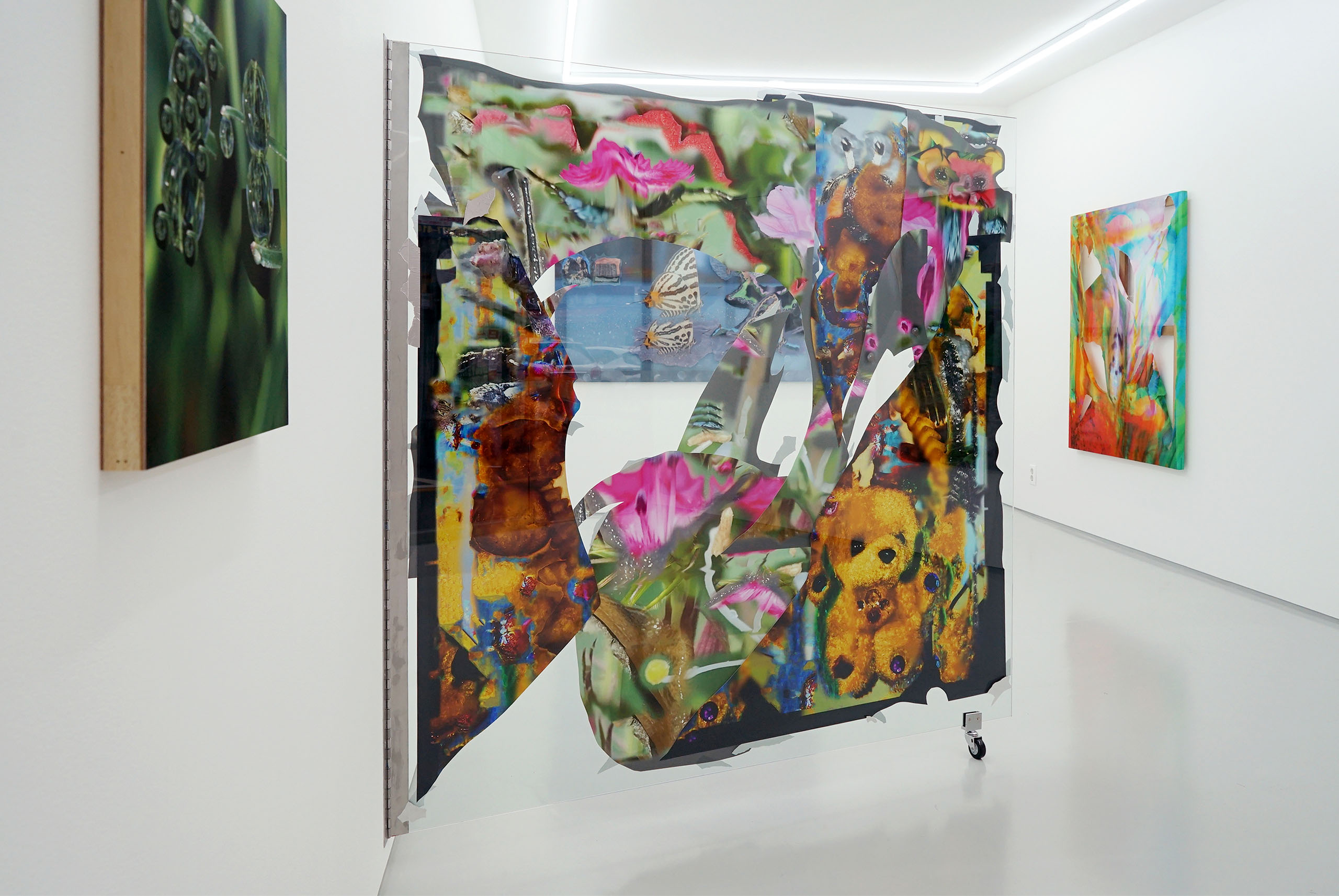 Installation view
of 《Softsharp》 (Cylinder, 2021) ©Kai Oh
Installation view
of 《Softsharp》 (Cylinder, 2021) ©Kai OhIn this way, Kai Oh explores the
ever-changing world paradoxically through the medium of photography, which
inherently captures moments and fixes subjects, while expanding photography
into a flexible, intermediary existence. In this process, the artist engages in
various media experiments, utilizing techniques for selecting, editing,
distorting, and post-processing photographic images alongside her own body as a
quasi-tool. Oh's work provides a glimpse into the contemporary extension of the
photographic medium.
"I'm interested in flexibility,
expandability, and recoverability. I want to explore phenomena that are often
overlooked because they are not immediately visible or present on the surface,
changing interpretations when the comparison group shifts, and imagined
scenes." (Kai Oh, from the BE(ATTITUDE) interview)
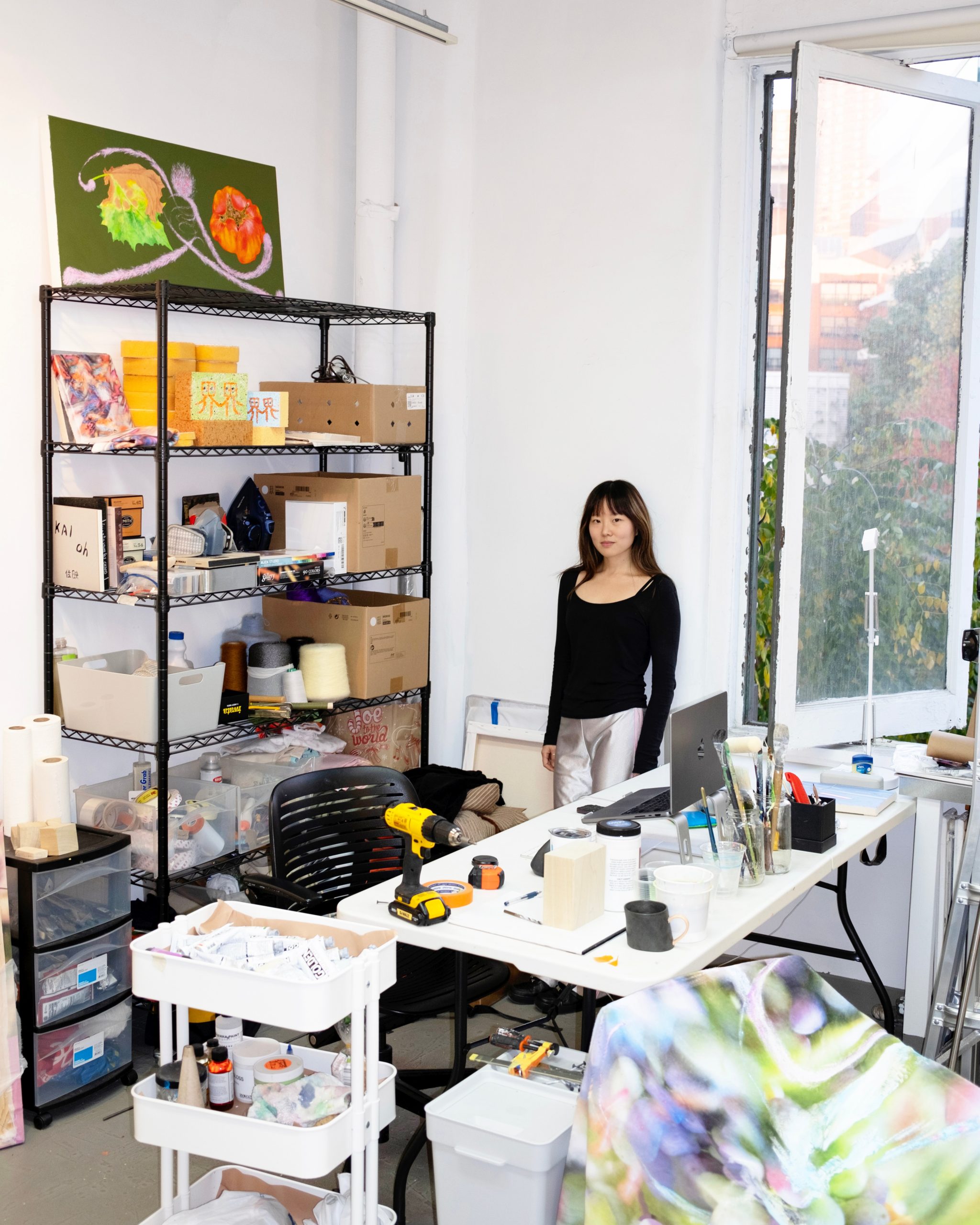 오가영 작가 ©SHOUTOUT LA
오가영 작가 ©SHOUTOUT LAKai Oh earned her BFA in sculpture at Seoul
National University, and the Academy of Fine Arts Nürnberg, and later studied
photography at Columbia University Graduate School. Her solo exhibitions
include 《Will you Marry Me?》 (Subtitled
NYC, New York, 2025), 《Half Sticky》 (IBK Industrial Bank of Korea, Seoul, 2023), 《Softsharp》 (Cylinder, Seoul, 2021), and
more.
In addition, she has participated in
numerous group exhibitions, including 《Autohypnosis》 (G Gallery, Seoul, 2023), 《The Postmodern
Child Part 2》 (Busan Museum of Contemporary Art, Busan,
2023), 《Rales, Wheezes and Crackles》 (DOOSAN Gallery, Seoul, 2022), 《Super-fine》 (Ilmin Museum of Art, Seoul, 2021), and 《Foam
Talent》 (Foam Amsterdam, Amsterdam, Netherlands, 2017).
Kai Oh is currently an artist-in-residence
at the 2025 Light Work Residency in New York and has been selected for several
artist support programs, including the IBK & GMoMA YOUNG ARTISTS 2023.
References
- 오가영, Kai Oh (Artist Website)
- 비애티튜드, 예기치 못한, 그래서 더욱 솔직한
- 화이트노이즈, 어색한 사이 (Whitenoise, Awkward Gaps)
- AHL Foundation, 2024 Space Uptown 2024: Fantasy in Abstraction
- 일민미술관, Super-fine: 가벼운 사진술 (Ilmin Museum of Art, Super-fine)
- 일민미술관, Super-fine: 가벼운 사진술 – 아티스트 토크: 김경태, 오가영 (Ilmin Museum of Art, Super-fine – Artist Talk: Kyoungtae Kim, Kai Oh)
- 지갤러리, 오토힙노시스 (G Gallery, Autohypnosis)
- IBK 행복나눔재단, [IBK & GMoma YOUNG ARTISTS 2023] 오가영 개인전: Half Sticky




















